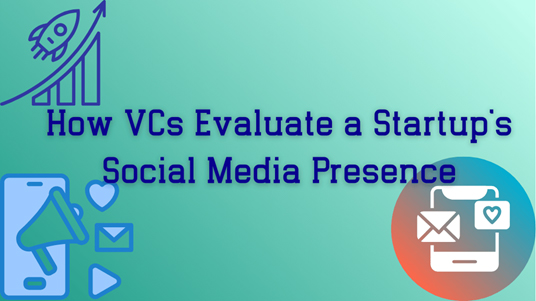
How VCs Evaluate a Startup's Social Media Presence


In the high-stakes world of venture capital, every data point in a startup's pitch deck is scrutinized. Revenue projections, customer acquisition costs (CAC), and lifetime value (LTV) are dissected with precision. But what about social media? For years, founders have flashed impressive follower counts as a proxy for market traction. However, seasoned investors know that in the digital age, not all audiences are created equal. The conversation has moved far beyond simple vanity metrics.
So, if a massive follower count no longer guarantees a VC's approval, what are they looking for? They're conducting a form of digital due diligence, searching for authentic signals of a healthy, growing business embedded within your likes, shares, and comments.
Metrics That Signal a Strong Product-Market Fit

Beyond simple engagement rates, investors are hunting for social media activity that serves as a leading indicator of strong product-market fit. They are looking for evidence that your product or service resonates so deeply with a core audience that it sparks organic conversation and advocacy.
Here’s what they’re really measuring:
User-Generated Content (UGC): Are customers so passionate about your product that they are creating their own content featuring it? This is the gold standard of digital word-of-mouth and a powerful signal that you’ve built something people genuinely love.
High-Intent Inquiries: VCs will look for comments and messages that show clear purchasing intent. Questions like, "When will this be available in India?" or "Does this integrate with Salesforce?" are far more valuable than generic praise. They indicate that your social channels are a functioning part of your sales funnel.
Organic Community Defense: When a negative comment appears, does your community jump in to defend your brand before you do? This kind of organic advocacy is priceless and shows investors you have built a loyal following that feels a sense of ownership. Research from a source highlights that community-driven growth is a key pattern in successful ventures.

The Shift from Audience Size to Audience Quality
It's tempting to believe that a large following is a direct indicator of success, but investors are increasingly skeptical. The ease of acquiring running superficial giveaway campaigns has devalued follower count as a primary metric. Instead, the focus has shifted to the quality and depth of the interactions happening within that audience. A startup with 10,000 highly engaged, real followers supported by Views4You, for example, is often more valuable than one with 100,000 passive ones.
VCs are looking for an active, vibrant community, not just a large, silent crowd. They will scan your comment sections. Are users asking thoughtful questions? Are they tagging friends? Is there a genuine back-and-forth conversation? This qualitative analysis reveals more about brand loyalty and product-market fit than any top-line number ever could.

Connecting Social Media to Business KPIs
Ultimately, every aspect of a business must tie back to its financial health and strategic goals. An investor wants to see how your social media efforts are not just building a brand, but also driving tangible business outcomes. A beautiful Instagram feed is nice, but one that demonstrably lowers CAC is compelling.
Consider how your social activity impacts core business metrics. For instance, using social media for customer support can be a public display of excellent service while simultaneously reducing the load on your support team. Similarly, an active and well-managed online presence can significantly reduce customer churn. Studies show that channels with high user interaction rates can generate better customer retention, making it crucial to foster genuine social media engagement rather than just chasing follower numbers. This demonstrates to VCs that your social strategy is a strategic asset, not an expense.

Red Flags VCs Spot Immediately
Just as there are positive signals, there are also glaring red flags that can quickly sour an investor's interest. Being aware of these can prevent you from making a poor impression during their informal due diligence.
The most common warning signs include:

Vastly Disproportionate Follower-to-Engagement Ratio: A profile with 200,000 followers but only 50 likes and two generic comments per post is an immediate red flag for purchased or low-quality followers.
Inconsistent Messaging and Branding: A scattered social media presence that lacks a clear voice or consistent visual identity suggests a lack of strategic direction.
A "Ghost Town" Community: Posts with zero comments or questions indicate that the content isn't resonating or that the audience isn't real.
Poorly Handled Negative Feedback: Deleting critical comments or responding defensively shows a lack of transparency and an inability to learn from customer feedback, a critical trait for any startup. As detailed by venture firms like Andreessen Horowitz (a16z), understanding and responding to user sentiment is non-negotiable.
In the end, VCs view a startup's social media presence as a microcosm of the business itself. They’re looking for authenticity, a deep connection with customers, and proof that you are building not just a product, but a sustainable brand with a loyal community at its core.
Frequently Asked Questions

How can an early-stage startup with a small budget demonstrate social media traction to VCs?
An early-stage startup should focus on depth over breadth. Instead of trying to be everywhere, dominate a single channel where your target audience is most active.
Do VCs care about which specific social media platform a startup uses?
Yes, but only in the context of the startup's target market.
Is a large follower count ever a good thing in the eyes of an investor?
Absolutely, but only when it is supported by correspondingly high levels of authentic engagement and can be linked to business goals
Should the founder be the public face of the company on social media?
It can be a powerful strategy, especially in the early stages. A founder-led presence can build trust and authenticity, giving the brand a human voice.
